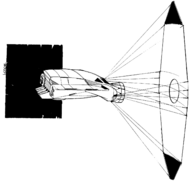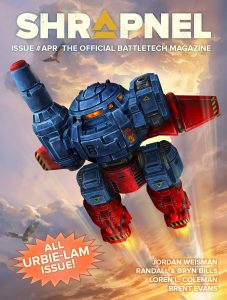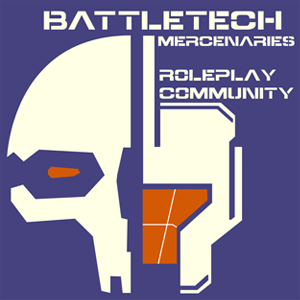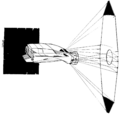Difference between revisions of "Hunter (JumpShip class)"
Csdavis715 (talk | contribs) m |
Ocherstone (talk | contribs) |
||
| Line 24: | Line 24: | ||
| Armor = 40 tons | | Armor = 40 tons | ||
| DropShip Capacity = 1 | | DropShip Capacity = 1 | ||
| − | | Crew = | + | | Crew = 13<ref name=TRO3057r>''Technical Readout: 3057 Revised'', p. 110</ref> |
| − | * 3 Officers | + | *3 Officers |
| − | * | + | *8 Enlisted |
| + | *2 Gunners | ||
| + | ---- | ||
| + | (Crew Types)<ref name="BSr63">''BattleSpace'' rulebook, p. 63</ref><br/> | ||
| + | *2 Pilots <br /> | ||
| + | *2 Engineers <br /> | ||
| + | *6 Secondary Engineers | ||
| Grav Decks = None | | Grav Decks = None | ||
| Escape Pods/Life Boats = 4 Life Boats | | Escape Pods/Life Boats = 4 Life Boats | ||
| Line 42: | Line 48: | ||
==Cargo== | ==Cargo== | ||
| − | The original ''Hunter'' design can carry between 1021 and 1097 tons of cargo depending on the exact variant (see below) | + | The original ''Hunter'' design can carry between 1021 and 1097 tons of cargo depending on the exact variant (see below) and may have or not have room for 10 passengers. However, most have since been upgraded to mount a [[Lithium-Fusion Battery]] system at the expense of 950 tons of cargo space (1% of the ship's mass is required for the battery). |
In addition to the DropShip berth, a [[K-1|K1C]] [[DropShuttle]] is often carried to facilitate the vessel's reconnaissance and exploration duties.<ref name="BSr52">''BattleSpace'' sourcebook, p. 52</ref> | In addition to the DropShip berth, a [[K-1|K1C]] [[DropShuttle]] is often carried to facilitate the vessel's reconnaissance and exploration duties.<ref name="BSr52">''BattleSpace'' sourcebook, p. 52</ref> | ||
| Line 49: | Line 55: | ||
The [[BattleSpace]] rulebook provides a step-by-step guide to the designing rules by designing a sample ship class; it is explicitly stated at the end of the process that the "completed JumpShip belongs to the ''Hunter'' class". However, this (prototype) ''Hunter'' and the stats given for the ''Hunter'' in the Large Ships section of the sourcebook differ from later published entries: It had room for 10 passengers, a cargo capacity of 1,031.5 tons, and mounted one anti-missile system. with three tons of ammunition (instead of two systems with four tons). The stats also contain a cargo capacity of only 1021 tons, which may be in error as they are otherwise identical.<ref name="BSr63">''BattleSpace'' rulebook, p. 63</ref> | The [[BattleSpace]] rulebook provides a step-by-step guide to the designing rules by designing a sample ship class; it is explicitly stated at the end of the process that the "completed JumpShip belongs to the ''Hunter'' class". However, this (prototype) ''Hunter'' and the stats given for the ''Hunter'' in the Large Ships section of the sourcebook differ from later published entries: It had room for 10 passengers, a cargo capacity of 1,031.5 tons, and mounted one anti-missile system. with three tons of ammunition (instead of two systems with four tons). The stats also contain a cargo capacity of only 1021 tons, which may be in error as they are otherwise identical.<ref name="BSr63">''BattleSpace'' rulebook, p. 63</ref> | ||
| − | The standard version (from [[Technical Readout 3057]]) is presented here | + | The standard version (from [[Technical Readout 3057]]) is presented here and has no passenger capacity, but 1097 tons of cargo. |
| − | By the mid-[[thirtieth century]], most ''Hunters'' have been upgraded with a [[Lithium-Fusion Battery]] system, at the cost of a greatly reduced cargo capacity (950 tons less). The unmodified vessels were given to freebirth units. | + | By the mid-[[thirtieth century]], most ''Hunters'' have been upgraded with a [[Lithium-Fusion Battery]] system, at the cost of a greatly reduced cargo capacity (950 tons less). The unmodified vessels were given to freebirth units. It is unknown whether or not those vessels serving among [[Wolf's Dragoons]] were upgraded. |
| − | |||
| − | It is unknown whether or not those vessels serving among [[Wolf's Dragoons]] were upgraded. | ||
==Named Vessels== | ==Named Vessels== | ||
Revision as of 18:37, 22 February 2024
This article may require cleanup to meet BattleTechWiki's quality standards. The specific problem is: review needed. |
- This article is about the JumpShip. For other uses, see Hunter.

| |
| Hunter | |
|---|---|
| Production information | |
| Manufacturer | unknown (Clans) |
| Use | Exploration/Scout |
| Tech Base | Clan |
| Introduced | 2832 |
| Technical specifications | |
| Mass | 95,000 tons |
| Length | 302 meters |
| Sail Diameter | 850 meters |
| Fuel | 400 tons (4000) |
| Burn Rate | 9.77 |
| Top Thrust | 0.1 Gs |
| Sail Integrity | 3 |
| KF Drive Integrity | 3 |
| LF Battery | None |
| Armament | |
| Armor | 40 tons |
| DropShip Capacity | 1 |
| Crew | 13[1]
(Crew Types)[2]
|
| Grav Decks | None |
| Escape Pods/Life Boats | 4 Life Boats |
| Heat Sinks | 93 (186) |
| Structural Integrity | 1 |
| BV (1.0) | 1,915[3] |
Contents
Description
A scout JumpShip to seek out enemy fleets or explore new systems, the Hunter was designed by Clan Ghost Bear shortly after the founding of the Clans. It shares the best features of the Scout and Magellan classes: Like the former, it is small and stealthy, with a tiny emergence signature; like the latter, it is also equipped with an HPG to send messages over a distance of up to 50 lightyears. Like the other two designs, it is capable of prolonged independent operation; however, it also shares the lack of a Grav Deck, a drawback that requires the ship to spend fuel on thrust to generate gravity through acceleration (or risk deteriorating health and morale among the crew) and drastically shortens the actual time period until the ship requires refueling.
Armament
True to their nature, the Clans have armed even their nominally noncombatant JumpShips. Accordingly, the Hunter mounted five large pulse lasers, five streak SRM-4 launchers with one ton of ammunition each, and two anti-missile systems, with four tons of ammunition, in addition to adequate armor.
Cargo
The original Hunter design can carry between 1021 and 1097 tons of cargo depending on the exact variant (see below) and may have or not have room for 10 passengers. However, most have since been upgraded to mount a Lithium-Fusion Battery system at the expense of 950 tons of cargo space (1% of the ship's mass is required for the battery).
In addition to the DropShip berth, a K1C DropShuttle is often carried to facilitate the vessel's reconnaissance and exploration duties.[4]
Variants
The BattleSpace rulebook provides a step-by-step guide to the designing rules by designing a sample ship class; it is explicitly stated at the end of the process that the "completed JumpShip belongs to the Hunter class". However, this (prototype) Hunter and the stats given for the Hunter in the Large Ships section of the sourcebook differ from later published entries: It had room for 10 passengers, a cargo capacity of 1,031.5 tons, and mounted one anti-missile system. with three tons of ammunition (instead of two systems with four tons). The stats also contain a cargo capacity of only 1021 tons, which may be in error as they are otherwise identical.[2]
The standard version (from Technical Readout 3057) is presented here and has no passenger capacity, but 1097 tons of cargo.
By the mid-thirtieth century, most Hunters have been upgraded with a Lithium-Fusion Battery system, at the cost of a greatly reduced cargo capacity (950 tons less). The unmodified vessels were given to freebirth units. It is unknown whether or not those vessels serving among Wolf's Dragoons were upgraded.
Named Vessels
Notes
- In German products, the unit's proper name was translated to Jäger.
Gallery
Original Hunter from TRO:3057



